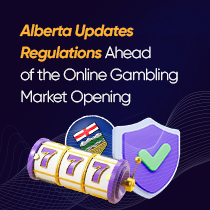Philippine iGaming Sector Demonstrates Unprecedented Growth Rates

The country has become a global leader in the share of online gambling in the economy. For comparison, in states like Australia, Canada, and the UK, this parameter typically fluctuates from 0.04% to 0.3%. The Philippines’ percentage is among the highest worldwide, reflecting the rapid expansion of the digital entertainment sphere.
Remarkable Growth of the iGaming Vertical
During the reporting period, the gambling sector's GGR soared by an impressive 27% YoY to reach $1.84 billion.
Other important figures for Q1:
- brick-and-mortar casinos produced 47.3% of the overall profit;
- digital games and bingo contributed nearly half of the total — 49.4%;
- online gambling alone surged 110% YoY to $834 million, surpassing land-based venues' revenue.
The pivotal moment occurred in Q4 2023, when the digital segment’s profit almost tripled to $325 million. Since then, the vertical has experienced steady growth, averaging 21% per quarter. This boost was linked to a crackdown on POGOs and shadow casinos serving overseas VIP customers.
Introduction of New Regulatory Measures
The rapid expansion of the online gambling sphere has sparked public and political controversy. The introduction of stricter market regulation measures is currently being considered and actively discussed in various circles.
Among the initiatives under deliberation are:
- blocking punters' access to e-wallets;
- raising the minimum wager from $0.35 to $87–175;
- implementing a new 10% tax alongside the existing fees of 40–45%;
- listing operators on the Philippine Stock Exchange to improve transparency.
PAGCOR, the country’s gambling regulator, has also called for the removal of all outdoor niche ads, such as banners and billboards.
The iGaming industry's progress relies heavily on the government’s approach to its regulation. Although there have been initial efforts to impose stricter rules, both local citizens and potential investors remain highly interested in the county's online sector.
Filipinos’ Viewpoints on Gambling

The Fourth Wall, a market research agency, surveyed residents regarding their attitude towards gaming. The findings revealed that safety and legitimacy are the most important factors for locals when selecting an entertainment portal. Consequently, many players have stopped participating in street gambling and using unregulated platforms.
Approximately 7% of punters still visit land-based casino venues. This tendency indicates the increasing prominence of licensed iGaming websites and a heightened interest in a secure entertainment environment.
The research firm additionally inquired about public opinion regarding the potential prohibition of all niche portals, including those holding government-issued certificates.
The results were as follows:
- 53% of respondents oppose such a decision;
- only 18% of the entire studied pool supports the measure;
- 75% of gamblers said restrictions would only push them to offshore platforms.
Furthermore, the survey analysed audience behaviour and risk profiles. Overall, 36% see themselves as moderate players who control their spending and rarely take out loans. Meanwhile, 12% were identified as a vulnerable group, as they often place bets and borrow money at the same time.
Residents’ Opinion on Regulators
The survey revealed the following results:
- 73% of locals consider the presence of a supervising body in the market important;
- 61% positively assess PAGCOR’s efforts in safeguarding gamblers’ rights and ensuring fairness;
- only 34% of respondents question the effectiveness of the industry regulatory authority.
The study demonstrates that oversight involves more than just rule enforcement. It also seeks to foster audience trust. First of all, locals appreciate security and prioritise legality.
Check the information used to contact us carefully. It is necessary for your safety.
Fraudsters can use contacts that look like ours to scam customers. Therefore, we ask you to enter only the addresses that are indicated on our official website.
Be careful! Our team is not responsible for the activities of persons using similar contact details.



